The UAMS College of Medicine congratulates the following faculty members who were honored for their innovations, humanism and contributions to the college’s work in education, research and clinical care. The awards were presented at Dean’s Honor Day on April 24.
Master Teacher Award
Michael Jennings, Ph.D.
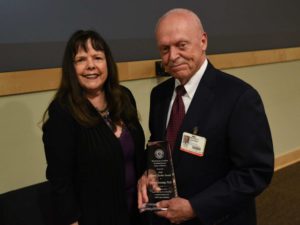
Jennings, who has served as professor and chair of the Department of Physiology and Biophysics since 1995, was honored for his advocacy of the active learning methods and integrated curriculum for first- and second-year medical students that the College of Medicine has today.
Gwen Childs, Ph.D., professor and chair of the Department of Neurobiology and Developmental Sciences, noted Jennings’ eagerness to champion curriculum reform, starting in the early 2000s, in addition to his other leadership roles and responsibilities and his work as an active researcher internationally known for his work in the mechanisms of ion transport.
“Dr. Jennings was an early and effective advocate for moving us toward a more integrated, active, organ-based curriculum for M1s and M2s,” Childs said. “He understood the need to better engage and integrate our students in the learning process.”
In addition to formal roles on committees, Jennings was effective in getting faculty members on board with curriculum advancements and methodologies such as problem-based learning, team-based learning and hands-on simulation education as the college shifted from traditional lecture-focused education, Childs said.
Educational Innovation
Kevin Phelan, Ph.D., and Gregory Snead, M.D.
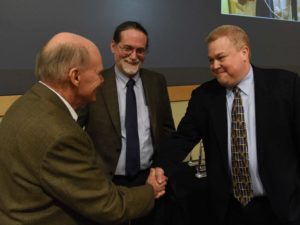
Phelan and Snead collaborated to bring anatomy to life for first- and second-year medical students with the help of portable, hand-held ultrasound devices.
Phelan, a professor in the Department of Neurobiology and Developmental Sciences, and Snead, an associate professor in the Department of Emergency Medicine, developed a series of comprehensive and clinically relevant training events that take place in the Center for Clinical Skills Education with standardized patients.
Students learn how to use the equipment and how to interpret, document and quantify aspects of ultrasound images, which revisit anatomical and physiological relationships in living subjects. For instance, students view the systole and diastole of the heart chambers in one session. The interaction with standardized patients also helps students build patient communication skills.
“Thanks to Dr. Phelan and Dr. Snead, what began as an elective learning experience with a few portable ultrasound units has grown into an important component of the M1-M2 curriculum,” David Davies, Ph.D., Director of the Human Structure Module, said when presenting the award.
Educational Research
John Spollen, M.D.
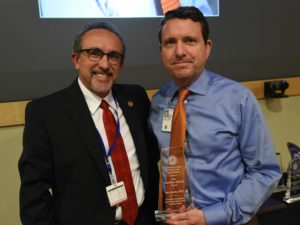
Spollen, professor and vice chair for education in the Department of Psychiatry, has led a number of research projects to help formulate strategies for drawing more medical students to psychiatry.
“Fewer than 5 percent of American medical school graduates choose to practice psychiatry,” said psychiatrist and Associate dean for Faculty Erick Messias, M.D., Ph.D., M.P.H. “Unfortunately, this is not enough to replace psychiatrists as they retire, jeopardizing the mental health and the wellbeing of Arkansans and people around the country and the world.”
“Dr. John Spollen realized that if we can better understand the personal and institutional factors that impact a medical student’s decision about pursuing psychiatry, then we can increase the number and quality of students who choose the specialty.”
Spollen analyzed factors at the top 25 and bottom 25 medical schools for recruiting students into psychiatry and found that the educational culture can have a significant impact. He subsequently worked with colleagues, including Messias, to analyze surveys of new medical students and graduates to learn more about students’ decisions about whether to train in psychiatry.
Excellence in Research
Edgar Garcia-Rill, Ph.D.
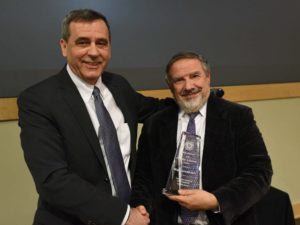
Garcia-Rill, a professor of Neurobiology and Developmental Sciences, has helped shape UAMS’ research enterprise over the past four decades.
His own research has yielded seminal contributions relating to disorders of the reticular activating system and sleep, schizophrenia and other neuropsychiatric disorders, and spinal cord injury.
In 2004, Garcia-Rill secured UAMS’ first Centers of Biomedical Research Excellence (COBRE) grant from the National Institutes of Health, establishing the Center for Translational Neurosciences (CTN).
The CTN’s impact has been extensive. One of its clinical cores, Pediatric Physician Learning and Collaborative Education (PedsPLACE), connects UAMS neonatologists with physicians around the state via telemedicine. Arkansas has seen a significant drop in infant mortality, an estimated 60 lives saved per year.
The CTN has helped UAMS faculty successfully compete for grants totaling more than $100 million and to secure five subsequent COBRE grants.
“As Dr. Garcia-Rill’s nominating colleagues emphasized, he is an outstanding mentor who often puts his own research on the backburner to help advance the careers of students, trainees and colleagues,” Richard P. Morrison, Ph.D., executive associate dean for research, said when presenting the award. “He has demonstrated how an outstanding researcher’s work can impact all of the missions of the university, well beyond the walls of a particular department.”
Leonard Tow Humanism in Medicine Award
Presented by the Arnold P. Gold Foundation
Jeannette M. “Jan” Shorey II, M.D.
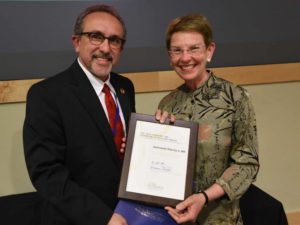
Shorey has been recognized nationally for her work as associate dean for continuing medical education and faculty affairs in the College of Medicine from 2004 to 2017, when she became UAMS provost for faculty.
“It is hard to imagine anyone who has more fully embraced the tenets of humanism in medicine,” Associate Dean for Faculty Erick Messias, M.D., Ph.D., M.P.H., said when presenting the Leonard Tow Humanism in Medicine Award to Shorey. “Dr. Shorey has devoted her career to the education, mentoring and support of humanistic-minded faculty members. She has touched the lives of medical students, residents and faculty throughout the college.”
Messias, who nominated Shorey, noted her work to expand faculty development and support services and to improve faculty policies, including promotion & tenure guidelines. She also led major initiatives to ensure the highest standards of professionalism for faculty members.
“At the center of this work is Jan’s deeply held, humanistic belief that the practice of medicine is an unbreakable commitment to serve others,” Messias said.
Residency Educator Award
Dale Blasier, M.D.
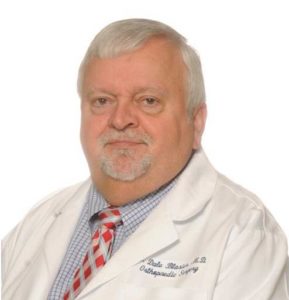
Blasier has directed the Orthopaedic Surgery Residency since 2003, earning accolades for ensuring the highest quality of training, enhancing scholarly activities for residents, and for his commitment to residents’ wellbeing and success.
“Performance by the residents on the Orthopaedic In-Training Exam (OITE) has reached new high levels,” Professor and Chair C. Lowry Barnes, M.D., wrote in his nomination letter, noting that they scored in the 91st percentile on the national exam this year. “The constant effort to refine and improve the didactic training has been effective.”
All four of the department’s chief residents joined Barnes in support of the nomination. “Dr. Blasier has been one of the greatest advocates and advisors for orthopaedic residents for years,” wrote John Wilkinson, M.D. “He is truly a bright spot and a cornerstone of a strong department.”
Jim Clardy, M.D., associate dean for graduate medical education, read from the letters of support at Dean’s Honor Day. Blasier was at a meeting in Washington, D.C., and unable to attend. Active nationally, he has served on the Resident Review Committee in Orthopaedic Surgery for the Accreditation Council for Graduate Medical Education (AGME) since 2010. He is a professor of orthopaedics and pediatrics.
Residency Educator Award
Henry “Hank” Farrar, M.D.
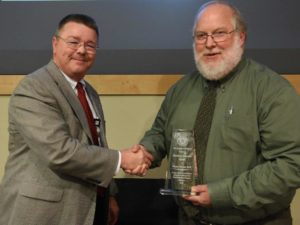
As director of the Pediatrics Residency, the College of Medicine’s largest residency training program, since 2004, Farrar has earned the admiration of many colleagues and hundreds of residents for his commitment to excellence, kindness and mentorship.
“Hank’s Pediatric Residency Program has maintained a pattern of excellence under his leadership, receiving the highest recognition in status by the ACGME, recruiting full classes of well-qualified residents each year, and maintaining performance metrics at or surpassing national standards each year,” assistant professors Jared Beavers, M.D., and Emily Smith, M.D., said in their nomination letter.
The program’s 2017-2018 chief residents wrote in support, emphasizing that Farrar has succeeded not only in training wonderful pediatric clinicians, but also in “instilling a sense of responsibility to serve the children of Arkansas.”
Next year’s chief residents also weighed in on the quality of Farrar’s training. “With each interaction, I always come away a more competent physician,” said one testimonial. Dozens of other residents signed the nomination.
Farrar is a professor in the sections of Pediatric Clinical Pharmacology and Pediatric Emergency Medicine.
